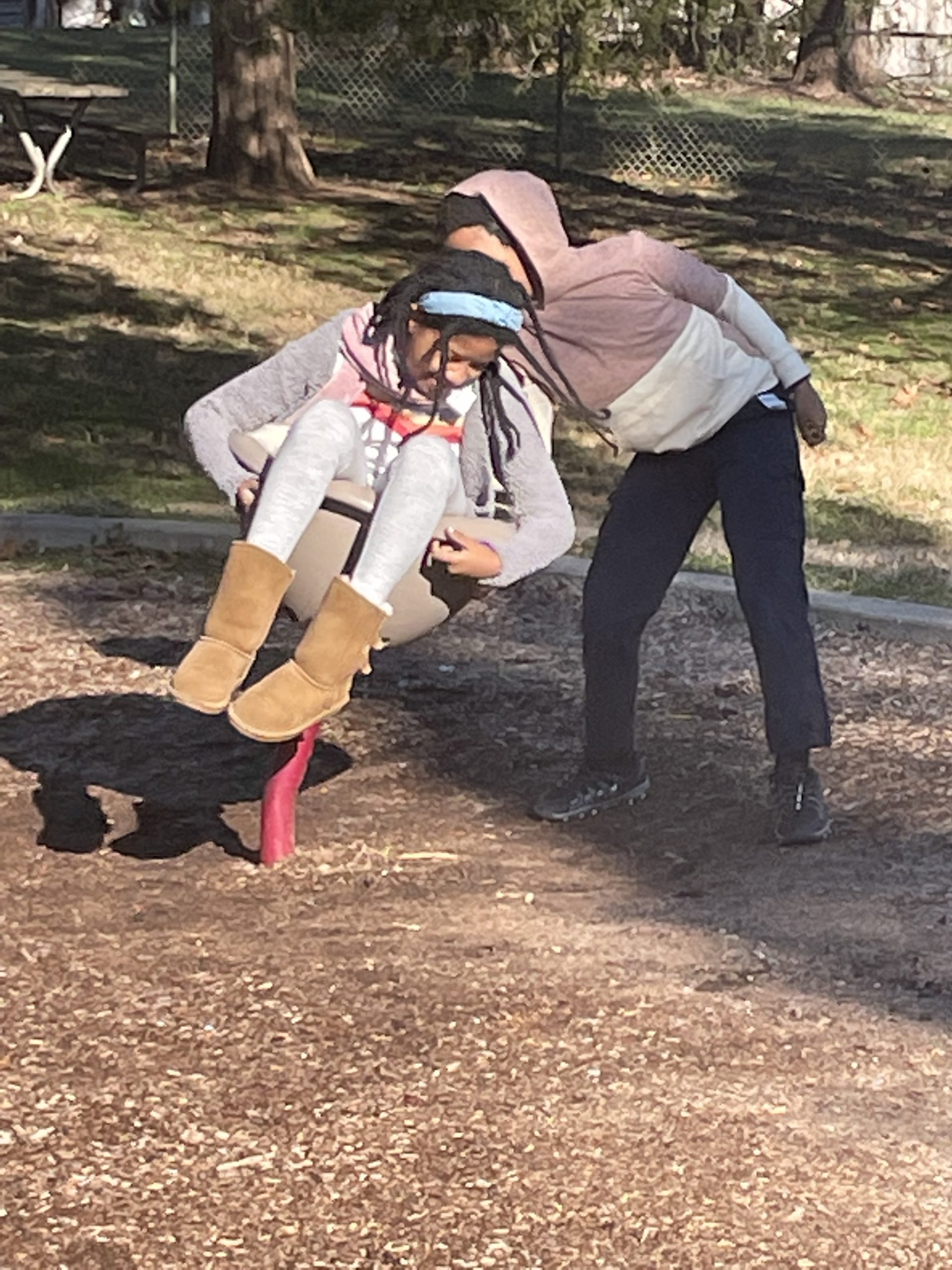Five Ways to Help Siblings Get Along
By TMoM Team Member Sydney D. Richardson, Ph.D.
Here’s the scenario: My children love the playground, and my oldest child really enjoys anything that spins. Therefore, when her sibling spun her around on the playground equipment, she laughed with excitement. Then, they switched places. Not only did the younger sibling not enjoy spinning, but the older sibling did not hear him when he yelled “stop” and started crying from an upset tummy. I quickly stepped in, stopped the spinning, and explained the importance of listening. Then, I stepped back and took a seat on the park bench.
The two decided to hug it out (I promise that I did not make them), and they walked around the park talking about the incident and resolving the issue on their own. I never heard a word that they uttered other than, “I’m sorry,” but I watched as they held hands while walking and talking around the park. When they came back around, I asked if everything was okay. They both said, “Yes, we worked it out” and they started playing again. We left the park about forty minutes later with no additional issues.

Three years ago, this was not a normal scene. My spouse and I would have been jumping into every argument, mediating every session, and yelling about treating everyone right. Occasionally, when a new type of argument pops up, we still have to mediate, but those are rare. The children have really learned to work on resolving their own issues by being clear with one another, direct, and honest, but also listening to one another and practicing forgiveness. So, how did we get here? That’s what I want to share with you.
Disclaimer: I am not a psychologist at all, so please know that I am sharing from personal experiences and child experts who I have learned from over the years.
Five Things to Consider When Helping Siblings Get Along
Praise the positive moments
A little goes a long way and the hard work is always on the front end. When children are young, encouragement is necessary and needed. Did you notice them sharing? Speak positively about that. Did you see one sibling feed another one (even incorrectly)? Thank them for helping out. Did you notice a sibling holding another sibling’s hand to calm his or her fears? That deserves a hug and a huge thank you. When children are young and not able to express themselves verbally, there are still ways to teach them the skills needed to solve problems. Recognizing and praising positive moments is a good starting point.
Teach them to respect boundaries
This is a hard one. I am a younger sibling and there is just something about being in an older sibling’s room that is special. It’s like telling a child not to eat the chocolate chip cookie, but leaving it out on counter. Who can resist? However, boundary setting is important. Often, we find out that the “don’t touch, it’s mine” and the “stay out of my room” is one sibling’s way of establishing territory and control because they might not feel as though they have any. That’s completely relatable. Whatever the issue is, it is important to help siblings understand why boundaries are important and show them how to respect said boundaries. Allowing siblings to figure out ways to share with each other works toward solving the problem. Also, having one sibling decide times when another sibling can enter his or her room resolves conflicts quickly.
Let older siblings help younger ones, but not parent them
My daughter is the oldest and she has no problem acting as a second mother to my son. This can occasionally end with an argument, as he doesn’t want to be bossed around. Therefore, I’ve had to step in from time to time to explain the difference between parenting and helping. There are really three parts to this.
- Help the older child understand what their role is and ways that they can act as a helper
- Monitor how they do this and offer correction when needed
- Help the younger child express how they want to be helped instead of them yelling “You’re not the boss of me!”
It takes some time to establish and everyone needs constant reassurance and correcting, but the hard work pays off over time.
Acknowledge emotions and establish clear expectations
As parents, we have a rule in our house where we say, “You can have emotions, but you can’t hurt anyone” (physically or emotionally). It’s important for children to know that emotions are real and they’ll always have them. They’ll experience anger, sadness, joy, boredom, and a host of other emotions. However, they are not to hurt another person because of those emotions. While this allowed us to be clear on our expectations, this meant that we needed to have outlets for the kids. That brings me to my next point.
Have an outlet
If you’re going to tell a child what they can’t do, then it’s important to channel that emotion (especially a negative one) somewhere else. When our son was younger, we got him an inflatable punching bag that would stand back up whenever he kicked it. At an age where he had trouble verbalizing himself, this toy came in handy. Additionally, we’d follow up with a talk once he got his emotions out.
For my daughter, she’d need time to herself whenever she was sad or angry about something and she often needed to listen to music. Therefore, we didn’t force her to spend time with us when she clearly needed a moment to process her emotions. Later, we’d make sure to talk with her and listen to her. As siblings, they soon learned to give one another time to work out their feelings before talking to each other. But, giving them outlets was a necessary component of the process.

There are a multitude of ways to work with your children on building and maintaining good sibling relationships. These are just a few ways. What is most important is to pay attention to the needs of your children, as each one is a unique individual with his or her own needs.
Want to see more blogs like this and get notifications on local events and happenings? Subscribe to our free weekly newsletters here.
